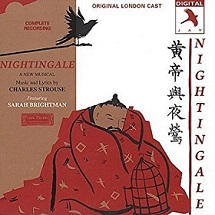| Nightingale | |
|---|---|
| A New Musical | |
 Original London cast recording | |
| Music | Charles Strouse |
| Lyrics | Charles Strouse |
| Book | Charles Strouse |
| Basis | Hans Christian Andersen story, "The Nightingale" |
| Productions | 1982 Off West End |
Nightingale: A New Musical is a musical (described by the composer as a children's opera) in one act, with book, music and lyrics by Charles Strouse. It is based on Hans Christian Andersen's 1843 fairy tale, "The Nightingale", and tells the story of a Chinese emperor who learns, nearly too late, that wealth cannot buy happiness.
Contents
- Musical numbers
- Synopsis
- Act 1
- Act 2
- New York City Full-Stage Production cast
- London Recording cast
- Notes
- External links
The work premiered in the US as a fully staged production at the First All Children's Theatre, 37 West 65th Street in New York, in May 1982, directed and staged by Meridee Stein, along with associate director and choreographer Linda Reiff, with sets by Oliver Smith, costumes by Christine Andrews, and lighting by Victor En Yu Tan. The music director was Wayne Green; the vocal director was Vicky Blumenthal; the stage manager was Janine Trevens. The orchestrations for the production were arranged by Robby Merkin. [1]
The group then gave a preview of the work in New York in March 1983 before the North American premiere at "The Barns" at Wolf Trap, Virginia, in April 1983. [2]
In the UK, it was first produced at the Buxton Festival and then in London at the Lyric Hammersmith beginning on 18 December 1982, with a cast including Sarah Brightman as the title character, Nightingale. Since then, the show has been performed numerous times throughout the world.
A cast album was released in 1985 with the London cast.[ citation needed ]